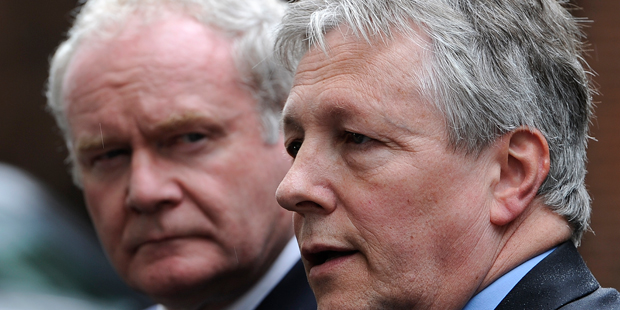End segregated schooling, says NI first minister
Northern Ireland’s first minister tells Channel 4 News it is time to end the “benign apartheid” separating Catholics and Protestant schoolchildren, which he says has contributed to a divided society.

The vast majority of schools in Northern Ireland fall into either the Catholic or mainly Protestant state sector. But the first and deputy first ministers of Northern Ireland want that to change.
Peter Robinson, DUP leader and Northern Ireland first minister, told Channel 4 News that separating children from an early age has led to a “benign apartheid”.
“You can’t send young people from different communities to different schools and then wonder why, in later life, we have these problems,” he said.
“We’ve come through a time of deep division in Northern Ireland. We are now in a position of having come through it, and we can see that a contributing factor was an education system where young people were separated.”
‘Them and us’
For decades, the DUP’s rallying cry was “Ulster says no”, led by former leader the Revd Ian Paisley. But in the new, post-“Chuckle Brothers” era of Northern Ireland politics, Mr Robinson said that this policy “won’t stretch the party at all”.
In his speech to the DUP party conference at the weekend, the first minister said that a better society could only be achieved by getting rid of a “them and us” attitude – and he put schools in the spotlight.
You can’t send young people from different communities to different schools and then wonder why in later life, we have these problems. Peter Robinson, NI first minister
Both the first minister and deputy first minister, Sinn Fein’s Martin McGuiness, have pledged to establish a ministerial working group to advance shared education, reporting to the education minister.
Next on the agenda is ensuring that all children have access to some kind of shared education by increasing the number of schools that share facilities.
“We need to do it in a way that is sensitive to the institution of the Catholic church,” Mr Robinson told Channel 4 News. “Like anything else, it will be a step by step process. It has to be done gradually.”
Martin McGuinness also spoke about the importance of pursuing shared education during the annual dinner of the NI Chamber of Commerce last week: “Don’t let anyone underestimate the challenge that we face in progressing shared education. There are many within our society, who may be still resistant to the reality of shared education,” he said.
Integration “can’t be forced”
Mixed or “integrated” education has been available in Northern Ireland for 30 years. Although 90 per cent of adults polled say they support integrated education in principle, only 7 per cent of pupils attend mixed schools.
Instead, Stormont is keen on “shared” education, where pupils from different schools come together for one subject or for extra-curricular activities.
The sharing education model, pioneered by Tony Gallagher, pro-vice chancellor at Queen’s University Belfast, has been gaining ground over recent years and has now involved over 10,000 pupils.
It’s only going occur through consensus and choice. I don’t think it’s about extending the number of integrated schools – maybe somewhere down the line. Tony Gallagher, Queens University pro-vice channcellor
Professor Gallagher welcomed the first minister’s comments, as well as Martin McGuiness’ continued support for the programme. But told Channel 4 News that integration can’t be forced.
“It’s only going occur through consensus and choice. I don’t think it’s about extending the number of integrated schools – maybe somewhere down the line, but I don’t think there’s enough support on the ground for that,” said Mr Gallagher.
Instead, the politicians and the academics are backing stronger relationships between schools working in the same area, allowing existing structures to accommodate a fundamental change in the Northern Ireland education system.
“There’s short term things that can be done to improve relationships and begin to break down these institutional barriers,” said Mr Gallagher.
-
Latest news
-
As India goes to the polls in the world’s largest election – what do British-Indians think?6m

-
Tees Valley: Meet the candidates in one of the biggest contests coming up in May’s local elections4m

-
Keir Starmer says public sector reform will be a struggle7m

-
Nicola Sturgeon’s husband Peter Murrell charged with embezzlement of funds from SNP1m

-
Ukraine might finally get $60billion in American weapons and assistance to defend against Russia3m

-




